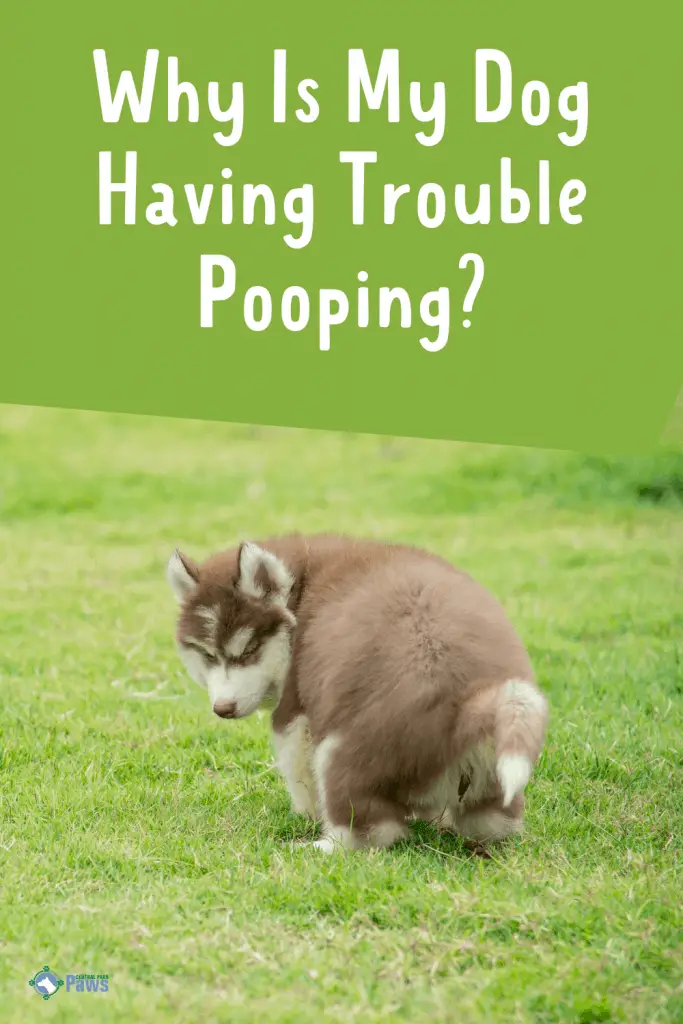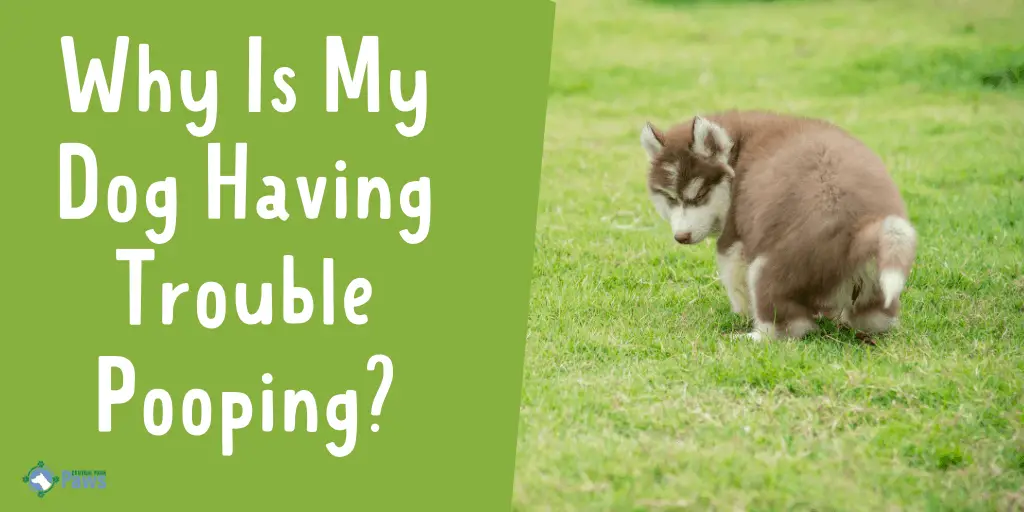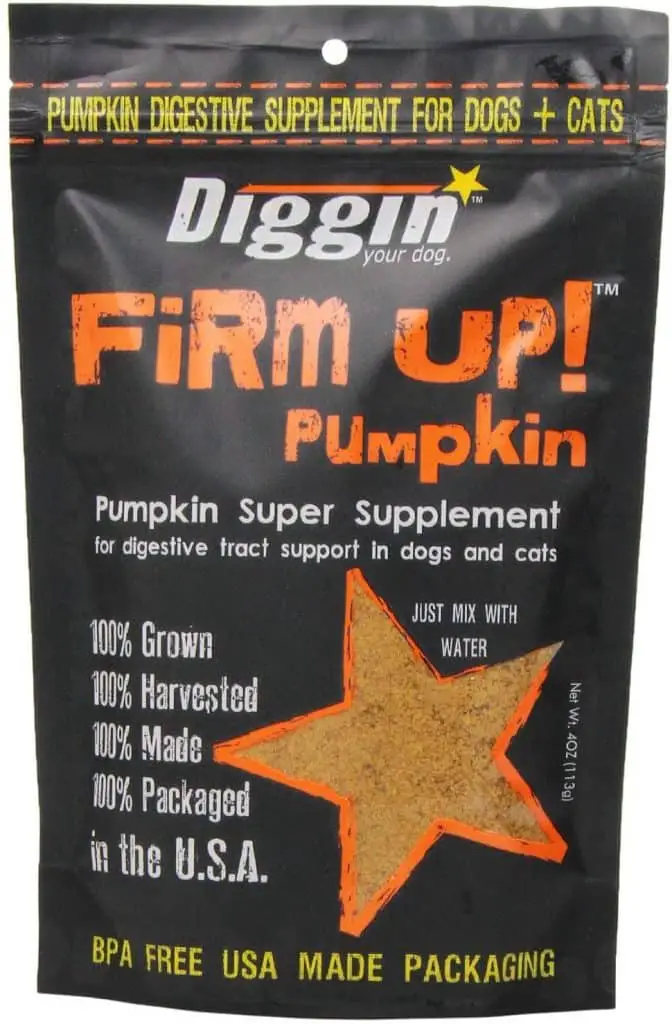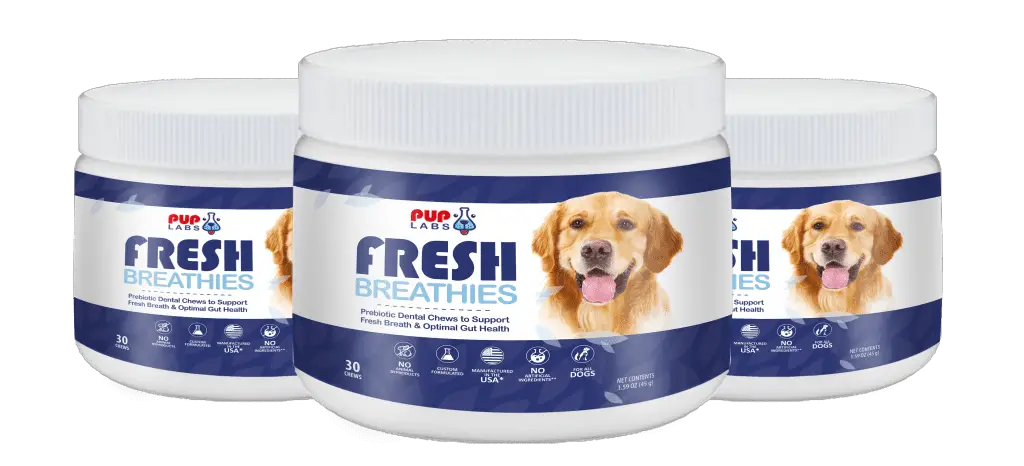Recently a friend reached out regarding their puppy, Hank, who is having some digestive issues.
Here is what my friend wrote to me:
My dog is having trouble pooping lately.
He squats in the yard for a couple of minutes, drops off a couple of stool samples, and then moves on to another spot where he repeats the process. This goes on for 10 minutes.
His stool is soft, and this only happens about once a week. What should I do?
Unfortunately, my friend recently moved and is between vets.
Also, since this has been going on for a little while now and only occurs infrequently, I felt comfortable discussing possible causes and remedies
What’s Going on with Hank?
After asking the critical questions about Hank’s well-being such as…
- Any changes in his appetite?
- Is there blood in his stool?
- How is his energy level?
…I was able to determine that it is not a critical situation, and likely safe to try a few remedies to help his trouble pooping.
When I hear a dog is straining to poop but not constipated, I always ask what the consistency of the poop is.
Gross I know, but poop can tell us a lot about what is going on.
So, when I found Hank’s stool was soft, it reminded me of my dog, Ginger, who’s had a similar issue since before she was one.
Though I hate when my dogs get sick, the one benefit is that it has given me extensive knowledge of random health issues in dogs.
In Hank’s case, I am inclined to believe that this is a minor GI imbalance and likely one that can be remedied with a change in diet as well as some added probiotics to promote good gut health[1].
Related: What to Do When You Find White Dots in Your Dog’s Stool
What Can You Do?
The first thing to do is add in some probiotics and maybe change their diet to one that has been enhanced with pro and prebiotics.
The added probiotic supplement will aid in making the transition to the new food easier on your dog’s stomach.
If your dog continues to have random bouts of soft stool, then considering a diet geared towards dogs with food sensitivities would be the next best step.
Home Remedies for Your Dog’s Pooping Problems
There are a few home remedies you can try for when your dog has soft stool:
- Yogurt or Cottage Cheese – Both contain bacteria that promote good GI health (Only use if you know your dog does not have a sensitivity to dairy)
- Bland Diet – A bland diet of boiled rice and ground beef or turkey can help settle an upset stomach
- Starchy Rice Water
- Canned Pumpkin – This stuff is magic and can be used for both diarrhea and constipation.
What do you like about these home remedies is that they are all safe to use and will not cause the issue to become worse.
OTC Remedies for Trouble Pooping
Over the counter remedies work great, especially if your dog needs a long-term remedy for their poop troubles.
- Diggin’ Your Dog Firm-Up – It helps when your dog has a soft stool and can be used daily or as needed
- Purina FortiFlora – This comes in a powder or tablet form (Though it is the most effective probiotic I have ever used with our dogs, the powder was not well received by Sophie, but my other dogs had no issues with it)
- NaturVet Probiotic Soft Chews – These are chewable and are more palatable for some dogs
- PetHonesty Probiotics for Dogs – This option does contain multiple allergens such as dairy and rice, but has also been created to be more appealing to dogs.
What Causes Dogs to Have Soft Stools
There are a variety of reasons why a dog may have soft stool.
For example, acute bouts of soft stool may be caused by stress or a dietary indiscretion such as eating something from the trash[2].
However, more chronic cases of soft stools are likely due to a food sensitivity, a GI imbalance, bacterial infection, or parasite.
When to Call the Vet
It is imperative that I state that I am not a veterinarian.
If Hank had more severe symptoms, I would encourage my friend to seek an emergency veterinary hospital.
It can be challenging to know when to bring your dog to the vet.
I understand better than most that no one wants to rush their pup in for every little thing, but nor does anyone want to underestimate the situation’s seriousness either.
Here is a list of symptoms that require veterinary assistance:
- Bloody diarrhea
- Watery diarrhea
- Vomiting
- Dehydration
- Lethargy
- Lack of appetite
- Multiple bouts of diarrhea
- Painful straining when trying to have a bowel movement
- Confusion or lack of coordination
If in the event your dog displays any one of the above symptoms it is a good idea that you seek veterinary attention.
Additionally, if mild symptoms continue or worsen after trying home remedies for a few days to a week, it is essential you bring them to the vet hospital.
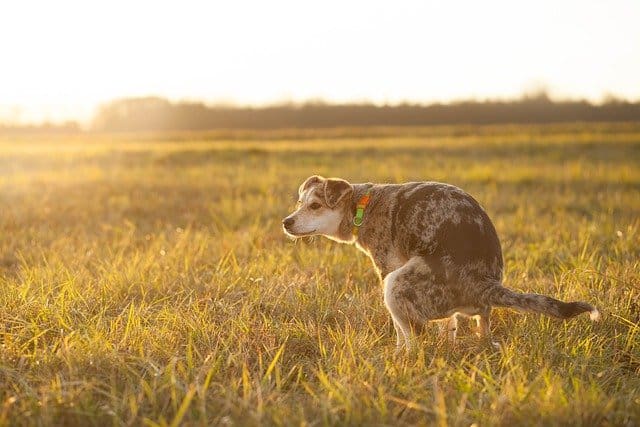
Conclusion
Though poop may not be everyone’s favorite subject, it is one of the best ways to track our dog’s health.
Although a change in your dog’s bowel movement may not be a cause for alarm, it can tell us a lot about how our dog is feeling.
Also, changes in our dog’s stool can be an early warning sign for a greater health issue.
If your dog is having a hard time pooping, try a few home remedies, but if symptoms worsen or continue for any length of time, it is vital to get your dog in to see your vet.
FAQs
What Do Soft Dog Poops Mean?
If your dog has soft poop, it could be caused by a change in their diet, food sensitivity, a dietary indiscretion, stress, parasites, bacterial infection, poisoning, illness, and possibly consuming an indigestible object.
What Do Hard Dog Poops Mean?
If your dog has hard poop, it means that they are constipated.
The two most common reasons for constipation are a lack of fiber in their diet or dehydration.
What Can I Give My Dog for Constipation?
If your dog or puppy is constipated, it is good to add more fiber to their diet.
Also, you can try plain pumpkin (not pumpkin pie mix), supplement such as NaturVet Stool Ease, or a vet approved laxative.
How Do I Know If My Dog Is Constipated?
If your dog has not had a bowel movement in one to two days or is straining to poop, they will likely be constipated.
When to Take a Constipated Dog to the Vet
If your dog has not had a bowel movement in one to two days, call your vet immediately as it may be a symptom of something more critical such as an intestinal blockage[3].
How Did My Dog Become Constipated?
There are various reasons why a dog may be constipated, such as a lack of exercise, lack of fiber, or too little fiber.
However, more critical reasons that cause constipation include tumors and blockages.
How Can I Prevent My Dog From Becoming Constipated Again?
Avoiding future constipation depends upon why your dog is constipated in the first place.
However, the most common preventatives would be a change in diet, added supplements, probiotics, and exercise.
Resources
- https://www.akc.org/expert-advice/nutrition/probiotics-for-dogs/
- https://vcahospitals.com/know-your-pet/colitis-in-dogs
- https://www.petmd.com/dog/care/dog-constipation-why-its-medical-emergency
